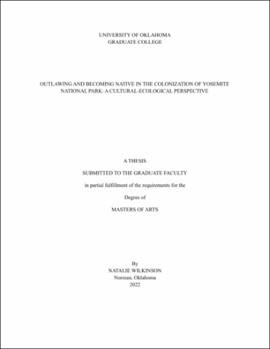| dc.description.abstract | Since the 1980s, Environmental historians have produced research disproving the myth of pristine wilderness. Yet, few environmental historians have focused their research efforts on considering how such a myth may have affected specific environments throughout time. I look at the birth of Yosemite National Park and consider the role pristine wilderness may have had as it influenced the way people interact, live, and manage the land and resources within the park's boundaries. Most importantly, perhaps, I consider the role the wilderness idea played in removing Indigenous people from the valley, and the ecological consequences of that process. This research makes use of the works of prominent anthropologists and archeologists, primary documents such as meeting notes, publications, and superintendent reports from late nineteenth-century Yosemite management, as well as the writings andilkin imagery created by iconic figures that made the wilderness of Yosemite a global phenomenon.
Additionally, while appreciating the value of indigeneity as an ethnicity, some forward-thinking social scientists, both Native American and not, argue that self-nativization in regards to a person's role in their environment, or becoming a local, is necessary to restore our ailing ecosystems. In this regard, this thesis finds the process of self-nativeization, or becoming local, was a natural evolution for new settlers and colonizers in Yosemite in the late nineteenth century due to key environmental factors. Despite the government's repeated attempts to restrict and even make any type of nativization or localization illegal within the park, worldviews belonging to new inhabitants evolved during the process of colonizing Yosemite in the late nineteenth century. This detachment from empire to colonial actor reveals that the wilderness idea was more a product of the American colonial empire rather than a strict belief of individual inhabitants and new settlers of Yosemite. | en_US |
